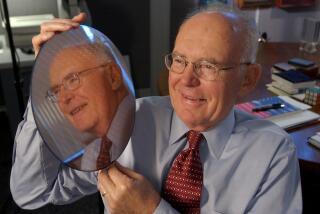AMD, Intel Settle Epic Court Fight on Chip Rights : Computers: Both sides declare themselves thrilled at ending the feud. AMD will pay more but is seen as the winner.
SAN FRANCISCO — Advanced Micro Devices Inc. and Intel Corp. on Wednesday settled their epic court battle over rights to microprocessor technology, ending one of the bitterest and most costly feuds in American business and paving the way for heightened competition in the computer chip market.
Observers immediately declared AMD the winner, even though the Sunnyvale, Calif.-based company will fork over $58 million to its far larger rival while receiving just $18 million in return. Industry analysts had feared that AMD might ultimately be forced to pay a much heftier sum to Intel, and thus viewed the settlement as removing a dark cloud. The settlement was announced after the markets had closed.
Both companies rejoiced at the prospect of ending a complex tangle of court cases that began in 1987 with the collapse of a technology-sharing partnership.
“We’re thrilled,” said Rich Lovgren, AMD’s acting general counsel. “We are paying an amount of money which is approximately what we would have spent in legal fees over the next year or two.”
*
F. Thomas Dunlap, Intel’s general counsel, said the true winner is innovation. “In the future,” he said, “AMD has to develop its own technology. We get some compensation for AMD’s use of our technology in the past. And they can’t use it in the future.”
W.J. (Jerry) Sanders III, AMD’s colorful chief executive, was effusive in declaring the customer the ultimate victor: “The AMD-Intel war is over, and the customer won. We’ll continue to be in the 386 and 486 markets, and the customer will continue to have aggressive pricing.”
Among key points of the agreement:
* Intel will receive $58 million to cover past damages from AMD’s illegal use in its 486 clone of a small portion of Intel microcode known as ICE, or in-circuit emulation.
* As ordered in a 1992 arbitration judgment--recently upheld by the California Supreme Court--Intel will pay AMD about $18 million for breach of contract and agreed not to contest rights granted to AMD in that proceeding.
* AMD will have a perpetual license to the microcode in Intel’s 386 and 486 microprocessors.
* AMD agreed that it has no right to copy any other Intel microcode, including that for the Pentium processor and the P6, the next-generation chip under development at the Santa Clara, Calif.-based chip giant.
* Intel and AMD will drop all pending cases against each other.
In a joint statement, the companies said they have been negotiating for four months at the suggestion of Judge Magistrate Patricia Trumbull of U.S. District Court in San Jose, who presided over long-running cases involving microcode for the 386 and 486.
*
The disputes date to a technology-sharing agreement first signed in the 1970s and extended in 1982. Intel granted AMD the rights to make chips based on Intel designs in exchange for AMD’s designs on other components--a then-common procedure in the chip world because customers often demanded multiple sources for key components.
But in the mid-1980s, Intel believed it was not getting enough in return from AMD--and it was loath to turn over the design for the cutting-edge 386 chip. AMD sued for breach of contract in 1987.
Since then, the companies have hauled each other in and out of court to argue various points. AMD won a victory last month when the state Supreme Court upheld an arbitrator’s decision on the original breach-of-contract allegation.
Intel won a round in October when a judge ruled in a separate case that AMD didn’t have the right to copy certain portions of the design of the 486 chip that were exclusively Intel property.
“Just to get these distractions resolved” represents a big victory for AMD, said Linley Gwennap, editor of Microprocessor Report in Sebastopol, Calif. “It’s amazing to me that after all these years, the parties could sit down and settle this in a few days. Maybe they’ll solve the baseball strike now.”







